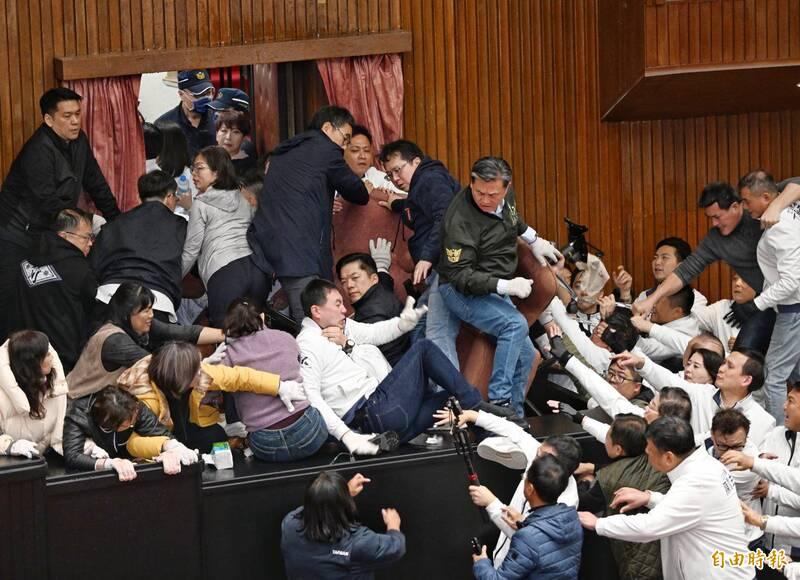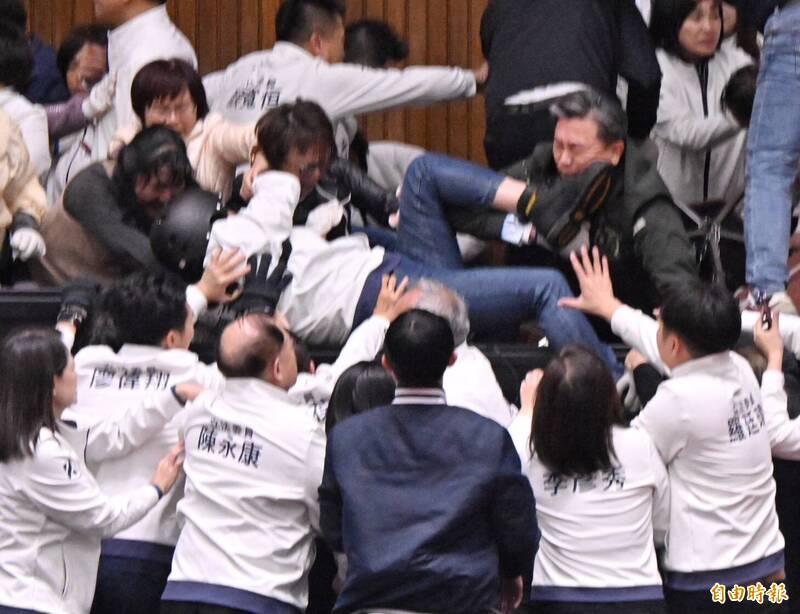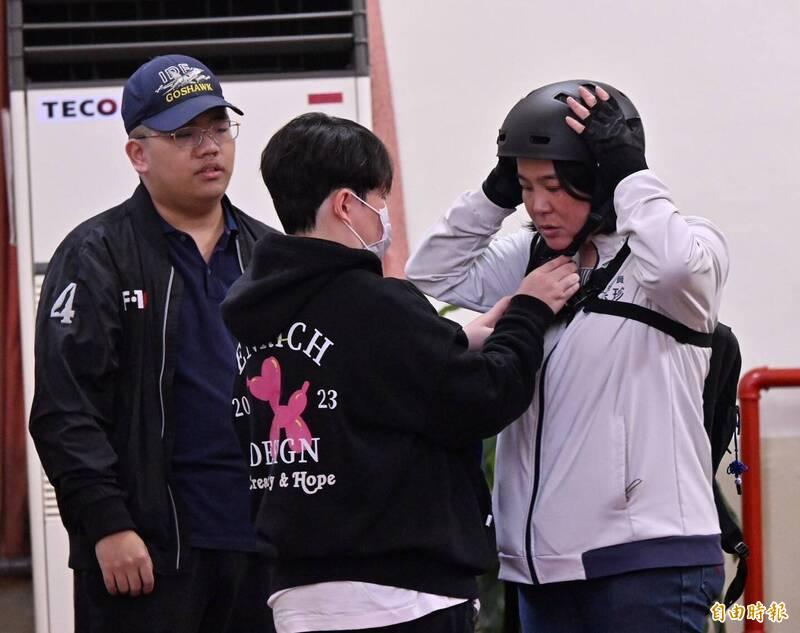Clashes broke out in the legislature this morning between Democratic Progressive Party (DPP) and Chinese Nationalist Party (KMT) legislators after DPP legislators occupied the legislative chamber and speaker’s podium to block the passage of proposed amendments.
The clashes were sparked after DPP legislators late last night entered the chamber by breaking windows and barricaded the doors to prevent KMT legislators from entering.
This morning, KMT legislators broke through the blockade to enter the chamber, leading to multiple clashes between the parties.

Photo: Fang Pin-chao, Taipei Times
The Legislative Yuan was meant to begin their meeting at 10am, but as the DPP and KMT clashed at the speaker’s podium, the meeting had still not begun at 10:30am.
On Tuesday, the Legislative Yuan’s Procedure Committee approved the KMT’s proposed schedule for the meeting today.
The proposed agenda prioritizes discusses amendments to the Public Officials Election and Recall Act today (公職人員選舉罷免法) related to stricter recall thresholds, amendments to the Constitutional Court Procedure Act (憲法訴訟法) about raising the threshold for constitutional court rulings, and amendments to the Act Governing the Allocation of Government Revenues and Expenditures (財政收支劃分法) concerning the allocation of national tax revenue.

Photo: Liu Hsin-te, Taipei Times
In the morning, DPP legislators had used chairs to block all entrances and exits to the chamber, and KMT legislators accused them of gluing the doors and securing them with heavy motorcycle locks, making entry impossible.
Around 8:30am, KMT legislators began to try to force open doors around the podium.
Verbal and physical clashes erupted after the KMT legislators broke through a door and entered the chamber at 9:13am.

Photo: Liu Hsin-te, Taipei Times
KMT Legislator Yeh Yuan-chih (葉元之) laid on the podium and legislators from both sides splashed water on each other.
Verbal clashes also erupted between legislators’ assistants outside the chamber.
KMT Legislator Lai Shyh-bao (賴士葆) was injured during the clashes and was helped by DPP Legislator Wang Cheng-hsu (王正旭), who has a medical background.
Another clash broke out at 9:44am, when KMT Legislator Jessica Chen (陳玉珍), wearing a safety helmet, attempted to pull DPP Legislator Chen Pei-yu (陳培瑜) and others from the speaker’s podium.
A physical clash again broke out when KMT Legislator Chang Chih-lun (張智倫) tried to climb onto the podium and was confronted by DPP Legislator Kuo Kuo-wen (郭國文), causing legislators from both sides to fall to the floor.
KMT legislators Yang Chiung-ying (楊瓊瓔), Chiu Chen-chun (邱鎮軍) and others later climbed onto the podium to remove DPP legislators Michelle Lin (林楚茵), Huang Jie (黃捷), Lin I-chin (林宜瑾) and others who were holding onto the podium to prevent the meeting from continuing.
Meanwhile, Taiwan People’s Party (TPP) legislators held banners in the chamber that read “hold the meeting,” “no violence” and “democracy is blocked.”
At 11:40am, Legislative Speaker Han Kuo-yu (韓國瑜) made his way from the meeting room to the legislative chamber, but DPP legislators blocked his way at the door.
KMT legislators pulled the DPP legislators away from the door and Han was escorted to the chamber by security guards, but he was still pushed and shoved to the ground.
Han reached the speaker’s podium and called for order in the chamber, announcing that the meeting had begun.
Due to excessive chaos in the chamber, in accordance with Article 35 of the Legislative Yuan’s procedures (立法院議事規則), a hand vote would be conducted, Han said, inciting cheers from KMT legislators.
The KMT would not allow President Lai to go on the violent path, KMT Chairman Eric Chu (朱立倫) said today, accusing the DPP lawmakers of reversing Taiwan’s democratic progress.
The ruling DPP is implementing “martial law” in the Legislative Yuan, TPP caucus whip Huang Kuo-chang (黃國昌) told a press conference this morning.
The ruling party is “attacking” the legislature with violence, overriding law and order and paralyzing the constitutional democracy of the nation, he said.
“DPP Chairman William Lai should come forward and face our fellow Taiwanese,” he continued, “Is that you who gave the order?”
The DPP tried hard to enter the meeting room because the KMT and the TPP were using their “majority dictatorship” to try to pass amendments that could bring irreversible harm to Taiwan’s democracy, DPP caucus chief executive Rosalia Wu (吳思瑤) said, using the microphone in the meeting room at 8am.
That is why the DPP had to take action to safeguard Taiwan, she said.
The coming weeks are crucial to the nation’s survival, DPP caucus whip Ker Chien-ming (柯建銘) wrote on Facebook last night.
There would be no more recall if amendments to the Civil Servants Election and Recall Act were to be approved because it would allow the KMT and the TPP to “cooperate” with China by proposing any unconstitutional bill they want to “mess up” Taiwan, he said.
Any unconstitutional bill could become constitutional as amendments to the Constitutional Court Procedure Act would prevent the Grand Justices from interpreting the constitution, he said.
Amendments to the Act Governing the Allocation of Government Revenues and Expenditures would leave no budget for the central government to implement any social welfare policy, he said.
“Would that be acceptable to the people?” he asked.

Taiwan is gearing up to celebrate the New Year at events across the country, headlined by the annual countdown and Taipei 101 fireworks display at midnight. Many of the events are to be livesteamed online. See below for lineups and links: Taipei Taipei’s New Year’s Party 2026 is to begin at 7pm and run until 1am, with the theme “Sailing to the Future.” South Korean girl group KARA is headlining the concert at Taipei City Hall Plaza, with additional performances by Amber An (安心亞), Nick Chou (周湯豪), hip-hop trio Nine One One (玖壹壹), Bii (畢書盡), girl group Genblue (幻藍小熊) and more. The festivities are to

Auckland rang in 2026 with a downtown fireworks display launched from New Zealand’s tallest structure, Sky Tower, making it the first major city to greet the new year at a celebration dampened by rain, while crowds in Taipei braved the elements to watch Taipei 101’s display. South Pacific countries are the first to bid farewell to 2025. Clocks struck midnight in Auckland, with a population of 1.7 million, 18 hours before the famous ball was to drop in New York’s Times Square. The five-minute display involved 3,500 fireworks launched from the 240m Sky Tower. Smaller community events were canceled across New Zealand’s

‘IRRESPONSIBLE’: Beijing’s constant disruption of the ‘status quo’ in the Taiwan Strait has damaged peace, stability and security in the Indo-Pacific region, MOFA said The Presidential Office yesterday condemned China’s launch of another military drill around Taiwan, saying such actions are a “unilateral provocation” that destabilizes regional peace and stability. China should immediately stop the irresponsible and provocative actions, Presidential Office spokeswoman Karen Kuo (郭雅慧) said, after the Chinese People’s Liberation Army (PLA) yesterday announced the start of a new round of joint exercises around Taiwan by the army, navy and air force, which it said were approaching “from different directions.” Code-named “Justice Mission 2025,” the exercises would be conducted in the Taiwan Strait and in areas north, southwest, southeast and east of Taiwan

‘SLICING METHOD’: In the event of a blockade, the China Coast Guard would intercept Taiwanese ships while its navy would seek to deter foreign intervention China’s military drills around Taiwan this week signaled potential strategies to cut the nation off from energy supplies and foreign military assistance, a US think tank report said. The Chinese People’s Liberation Army (PLA) conducted what it called “Justice Mission 2025” exercises from Monday to Tuesday in five maritime zones and airspace around Taiwan, calling them a warning to “Taiwanese independence” forces. In a report released on Wednesday, the Institute for the Study of War said the exercises effectively simulated blocking shipping routes to major port cities, including Kaohsiung, Keelung and Hualien. Taiwan would be highly vulnerable under such a blockade, because it